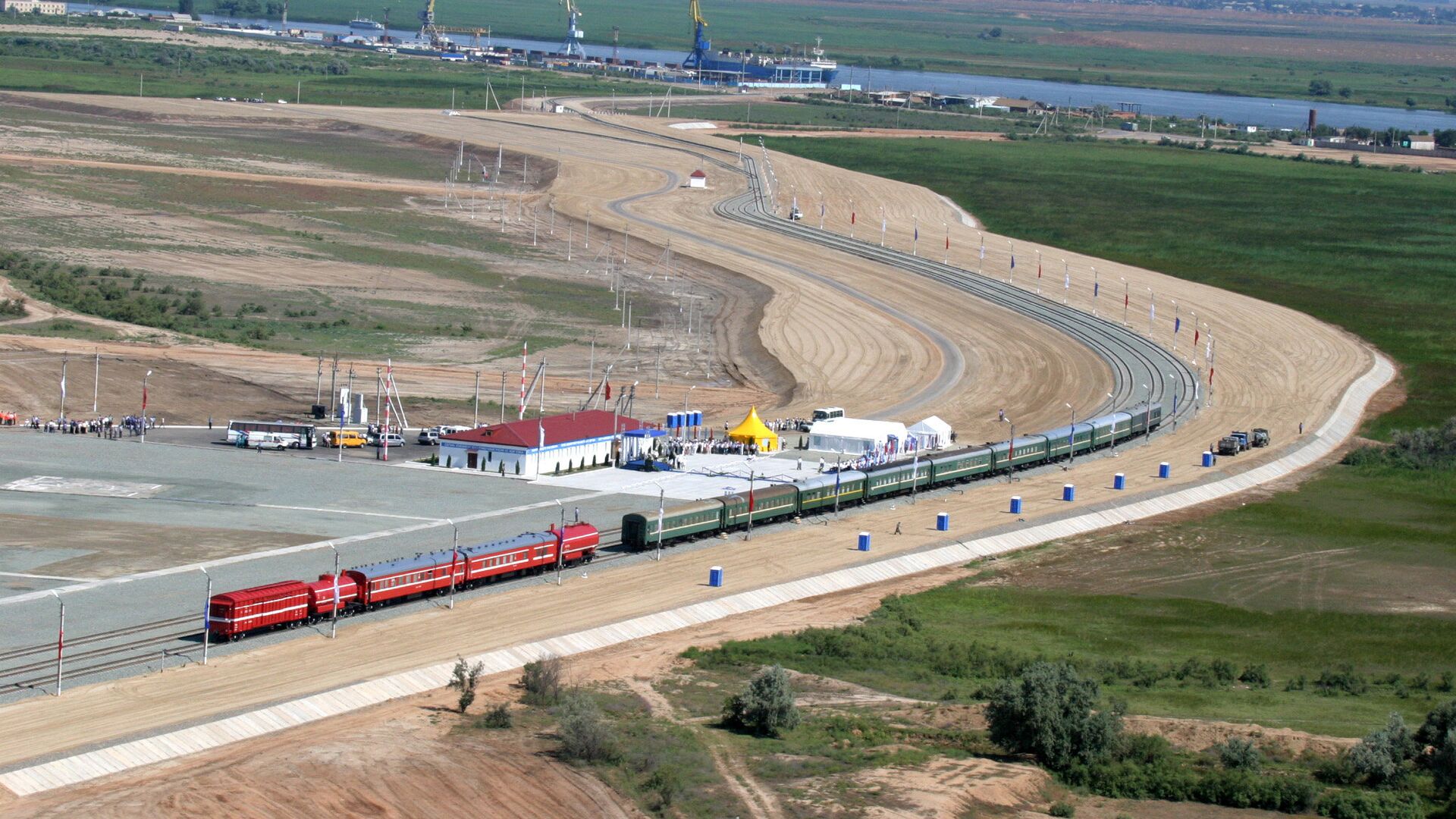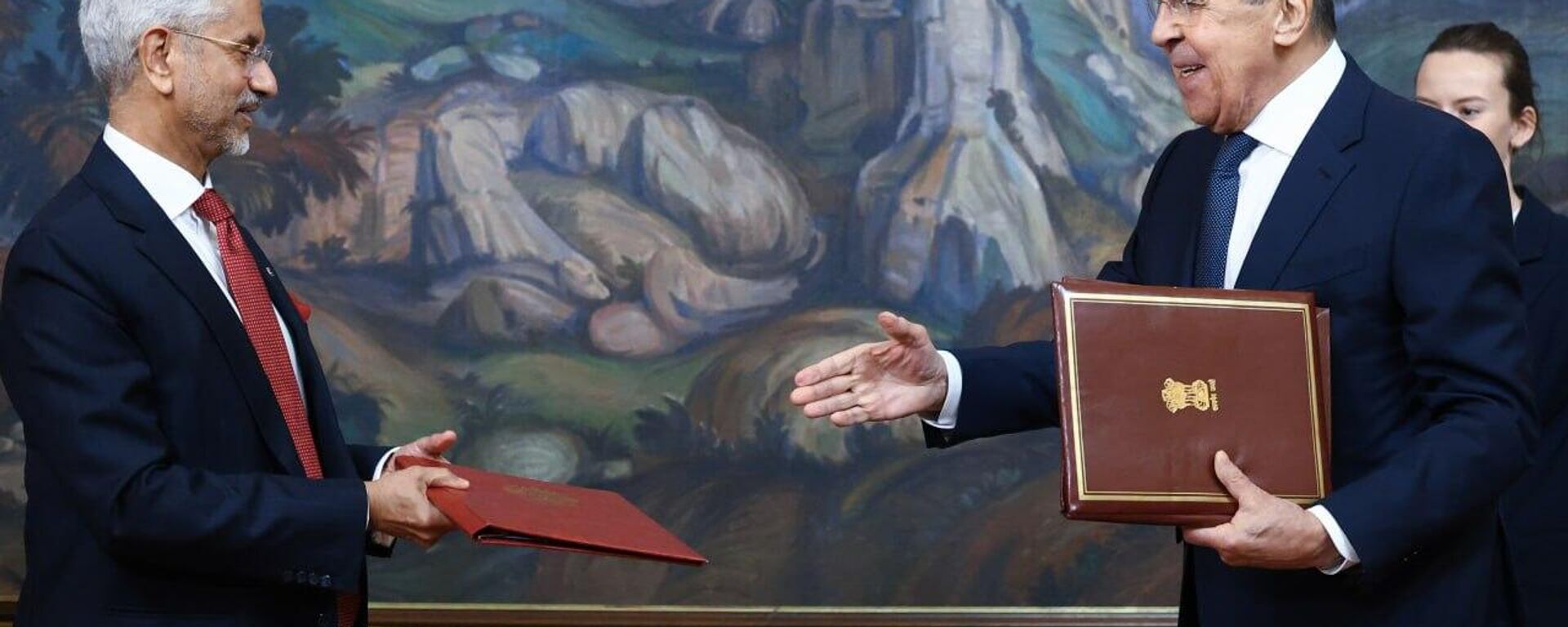https://sputniknews.in/20231228/north-south-corridor-to-become-increasingly-important-given-red-sea-trade-tensions-expert-6002810.html
North-South Corridor to Become Increasingly Important Given Red Sea Trade Tensions: Expert
North-South Corridor to Become Increasingly Important Given Red Sea Trade Tensions: Expert
Sputnik India
The relevance and attractiveness of the International North–South Transport Corridor (INSTC) as a connecting route , an expert says, will go up in future for various reasons.
2023-12-28T18:09+0530
2023-12-28T18:09+0530
2023-12-28T19:19+0530
indo-russian relations
india
iran
russia
european union (eu)
business
afghanistan
uzbekistan
kazakhstan
international north-south transport corridor (instc)
https://cdn1.img.sputniknews.in/img/07e7/0c/1c/6004616_0:107:2048:1259_1920x0_80_0_0_6e393c5f28022d96f3162e849f5eac1a.jpg
The International North–South Transport Corridor (INSTC) has “become far more relevant and its attractiveness as a connectivity route between the Global North and the Global South will only increase,” argued Paul Goncharoff, a businessman and chief manager of consulting firm Goncharoff.In light of the current stand-off in the Red Sea surrounding Israel's attack on Gaza, Goncharoff commented that the disruption of supplies there will only add to the INSTC's importance.The INSTC, however, still has some connectivity issues and bottlenecks, which are currently being resolved, he added.Freight transit along this route reached a record high last year and this trend is likely to continue, the businessman said.Talking about INSTC’s importance in India's Central Asian strategy, Goncharoff said that the INSTC is an important route as it reconnects India with markets in Central Asia that it lost during the partition with Pakistan in 1947.The distance between India's major west coast ports at Mumbai and Iran's Chabahar Ports is just 36 hours of sailing. From Iran, containers can now transit the country north and east and head into Kazakhstan and onto Uzbekistan, as well, in the future, into Afghanistan once the situation there permits,” he said.If the 7,200-kilometer-long transportation route that connects India, Iran, Azerbaijan, Russia, Central Asia, and Europe becomes a major transport corridor for Eurasia in the near future, geopolitical and logistical problems surrounding the Suez Canal will become more vibrant. The Suez is often criticized for it narrow width, for example.However, Goncharoff said it is hard to say when this will happen, but the “INSTC is a solution and [he] would expect it to play a role in European political decision-making to alleviate EU consumer costs and inflation.”
https://sputniknews.in/20231228/india-russia-instrumental-in-making-brics-representative-of-global-south-expert-5996267.html
india
iran
russia
afghanistan
uzbekistan
kazakhstan
Sputnik India
feedback.hindi@sputniknews.com
+74956456601
MIA „Rossiya Segodnya“
2023
Sushil Kumar
https://cdn1.img.sputniknews.in/img/07e7/0a/14/4972259_0:0:613:612_100x100_80_0_0_f89d4c7eaa17d23ebb41934f3e07e508.jpg
Sushil Kumar
https://cdn1.img.sputniknews.in/img/07e7/0a/14/4972259_0:0:613:612_100x100_80_0_0_f89d4c7eaa17d23ebb41934f3e07e508.jpg
News
en_IN
Sputnik India
feedback.hindi@sputniknews.com
+74956456601
MIA „Rossiya Segodnya“
Sputnik India
feedback.hindi@sputniknews.com
+74956456601
MIA „Rossiya Segodnya“
Sushil Kumar
https://cdn1.img.sputniknews.in/img/07e7/0a/14/4972259_0:0:613:612_100x100_80_0_0_f89d4c7eaa17d23ebb41934f3e07e508.jpg
international north–south transport corridor (instc), global north and the global south, paul goncharoff,
international north–south transport corridor (instc), global north and the global south, paul goncharoff,
North-South Corridor to Become Increasingly Important Given Red Sea Trade Tensions: Expert
18:09 28.12.2023 (Updated: 19:19 28.12.2023) The International North–South Transport Corridor (INSTC) connects India, Iran, Azerbaijan, Russia, Central Asia, and Europe. It is 7,200 kilometers long and, according to an expert, will become increasingly important in the future.
The International North–South Transport Corridor (INSTC) has “become far more relevant and its attractiveness as a connectivity route between the Global North and the Global South will only increase,” argued Paul Goncharoff, a businessman and chief manager of consulting firm Goncharoff.
In light of the current stand-off in the Red Sea surrounding Israel's attack on Gaza, Goncharoff commented that the disruption of supplies there will only add to the INSTC's importance.
“The route was always intended to be an alternative to the Suez Canal as it cuts 30 days off shipping times for goods between India and Russia. For example, consider the rate for a 40-foot container sent by the first train along the INSTC in October 2022 was about $10,000 from Moscow to Nava-Sheva (port of India). Today it is less than $5,000 and still dropping. That has become a rather more vital supply chain due to Russia's need to pivot to Asia and Asia's desire to replace predominantly European suppliers with the Russian market."
The
INSTC, however, still has some connectivity issues and bottlenecks, which are currently being resolved, he added.
Freight transit along this route reached a record high last year and this trend is likely to continue, the businessman said.
Talking about INSTC’s importance in
India's Central Asian strategy, Goncharoff said that the INSTC is an important route as it reconnects India with markets in Central Asia that it lost during the partition with Pakistan in 1947.
“The subsequent rivalry between New Delhi and Islamabad cut Indian overland trade routes west (to Iran) and north (to Afghanistan and Central Asia). These can now be partially restored via multimodal routes.
The distance between India's major west coast ports at Mumbai and Iran's Chabahar Ports is just 36 hours of sailing. From Iran, containers can now transit the country north and east and head into Kazakhstan and onto Uzbekistan, as well, in the future, into Afghanistan once the situation there permits,” he said.
If the 7,200-kilometer-long transportation route that connects
India, Iran, Azerbaijan, Russia, Central Asia, and Europe becomes a major transport corridor for Eurasia in the near future, geopolitical and logistical problems surrounding the Suez Canal will become more vibrant. The Suez is often criticized for it narrow width, for example.
“This simple fact will in time persuade the European Union that sanctioning Russian and Iranian ports in the longer term is not in their interests. Rising prices from using longer routes around the Horn of Africa will be passed onto the European consumer. That will eventually filter down into a political issue at the ballot box and will ultimately place European MPs in a position where to maintain popularity they will need to choose transportation cost pragmatism - or be forced out of office,” he said.
However, Goncharoff said it is hard to say when this will happen, but the “INSTC is a solution and [he] would expect it to play a role in European political decision-making to alleviate EU consumer costs and inflation.”



